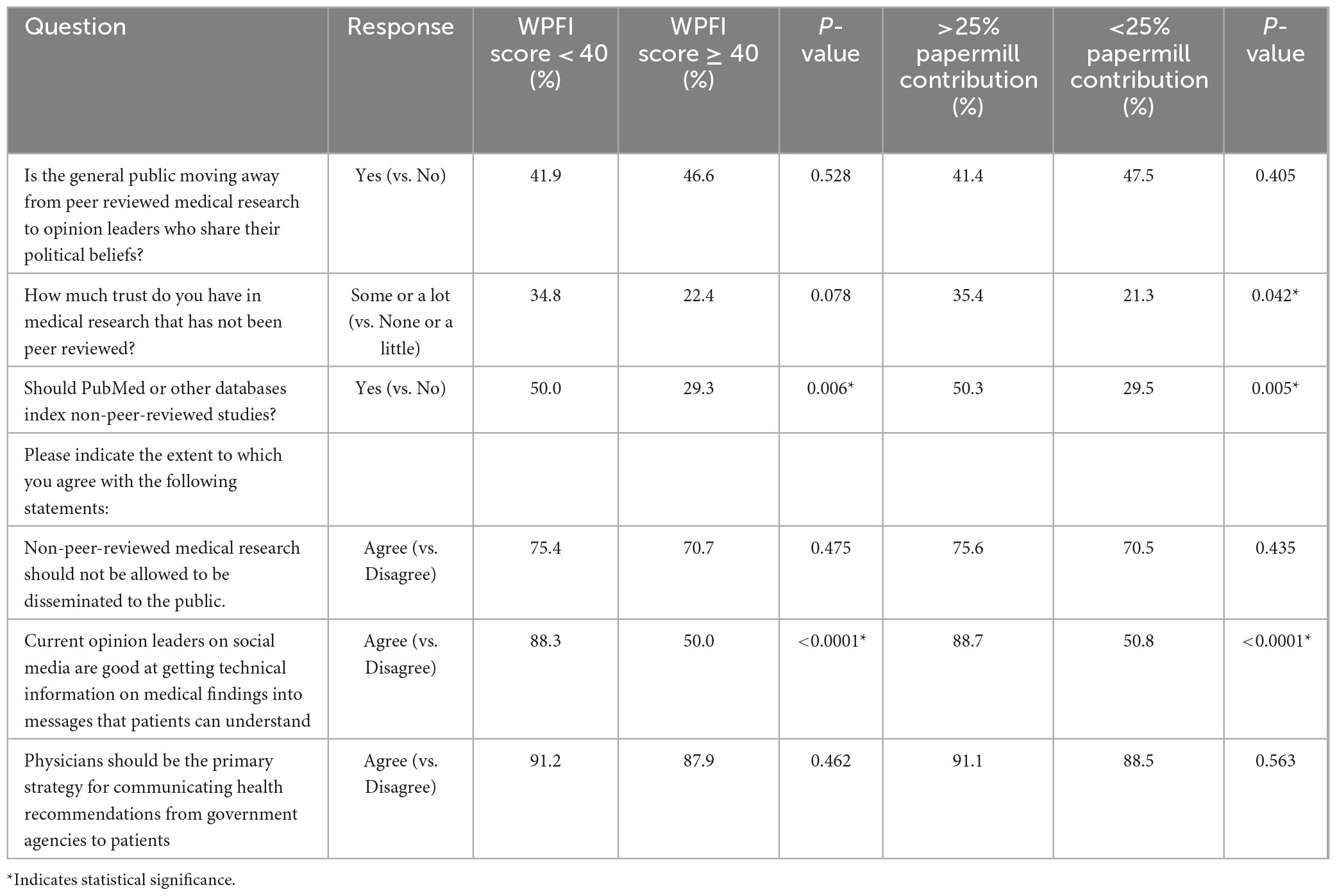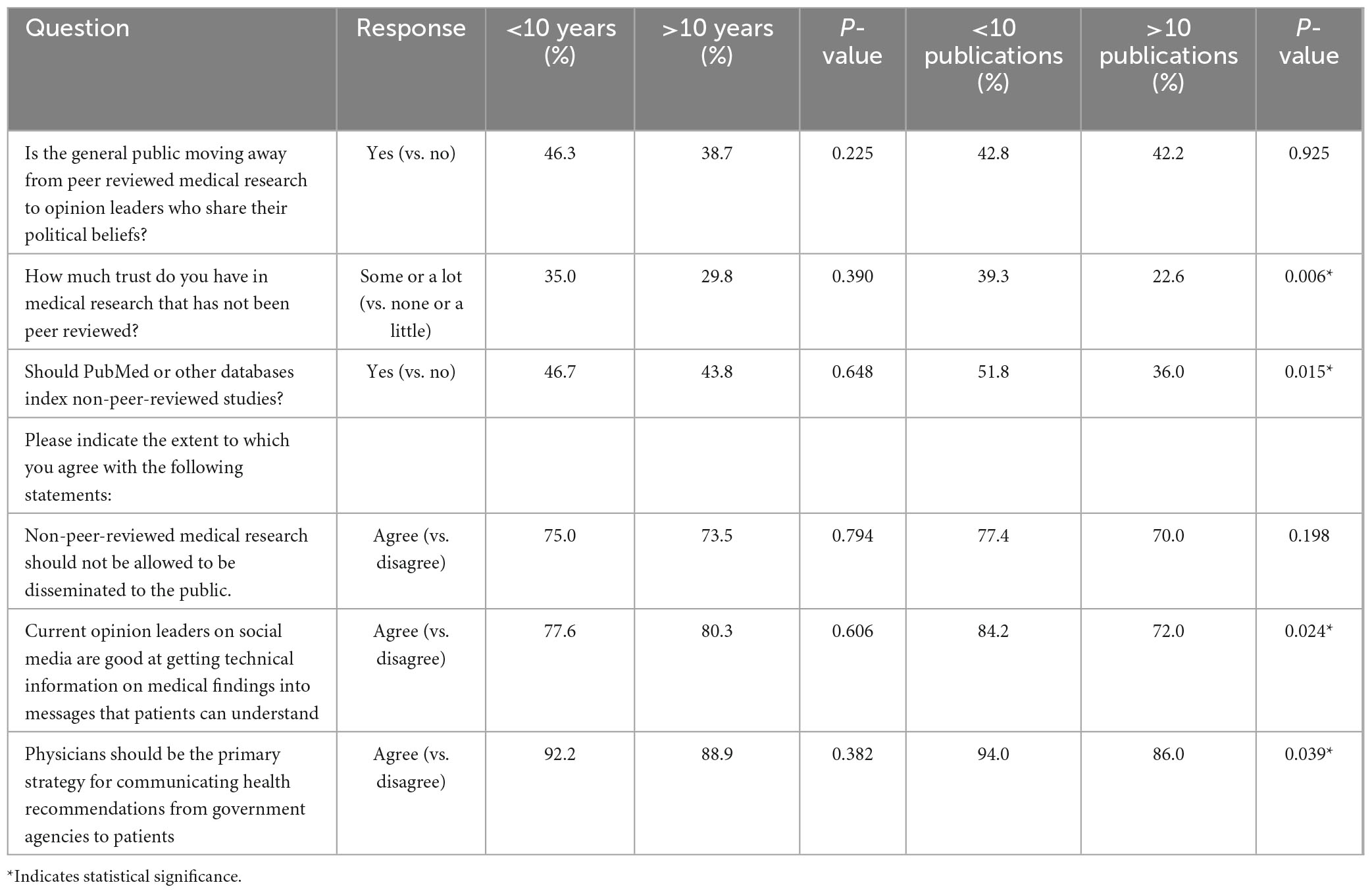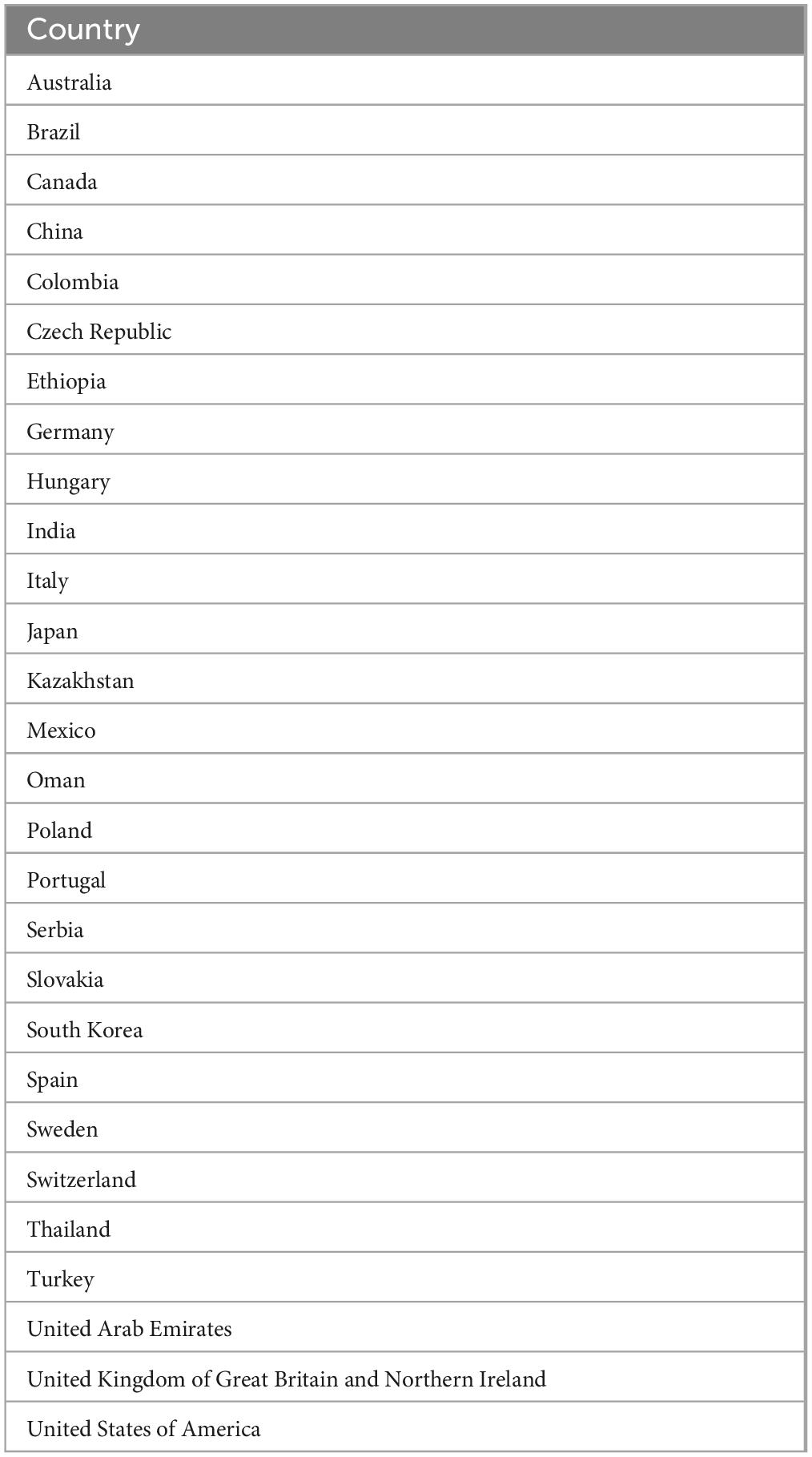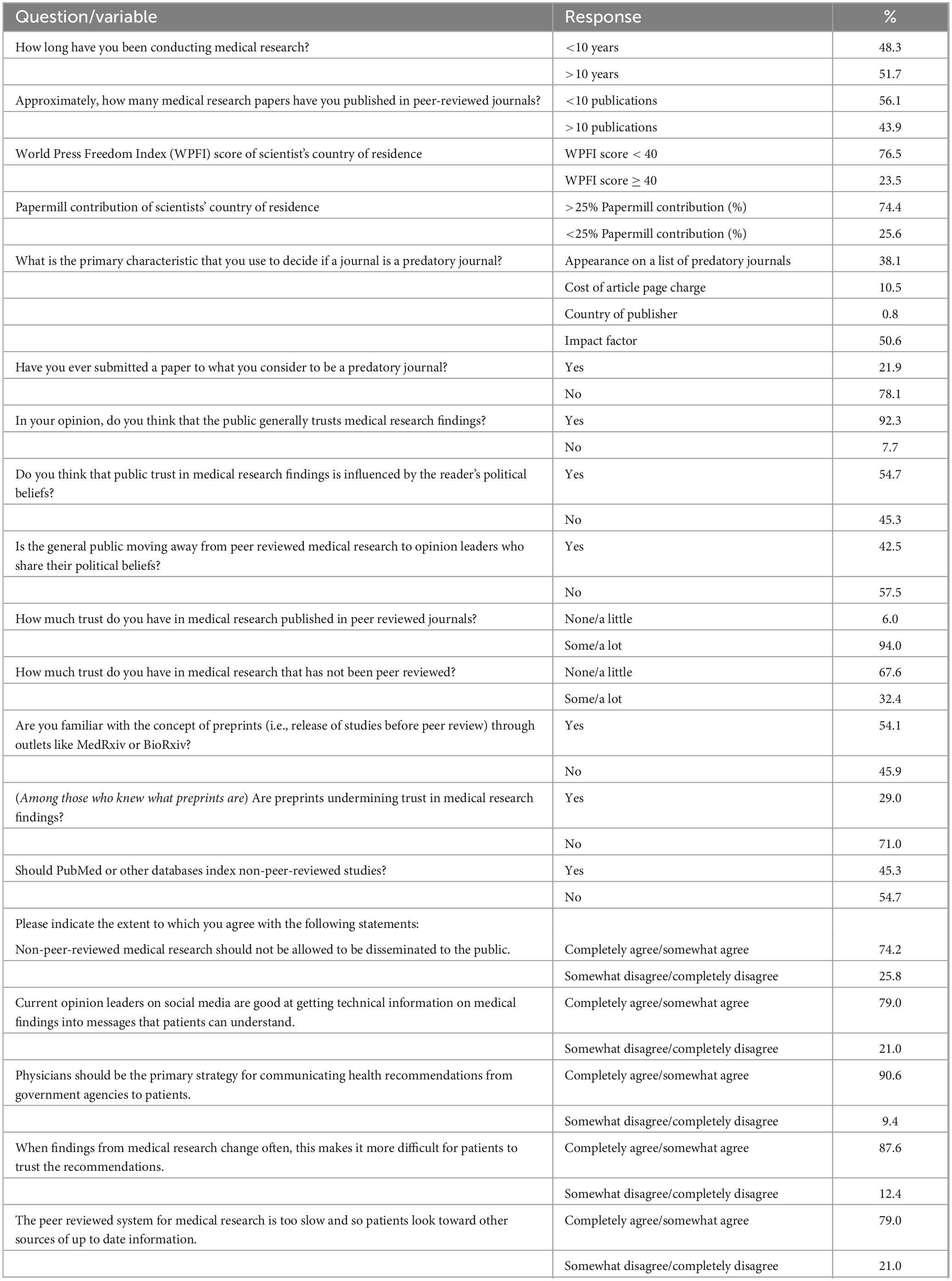- 1Department of Community Health and Family Medicine, University of Florida, Gainesville, FL, United States
- 2Department of Health Services Research, Management, and Policy, University of Florida, Gainesville, FL, United States
- 3Frontiers Publishing, Lausanne, Switzerland
Importance: Peer-review is the lynchpin to research integrity, quality and trust in published health research findings.
Objective: To evaluate the level of trust in peer-reviewed and non-peer-reviewed medical research among scientists who publish medical research.
Methods: A survey was conducted of corresponding authors of papers accepted for publication in a peer-reviewed medical journal between September and December 2024 (n = 285). Survey questions focused on trust in the results in peer-review and non-peer-reviewed results. Deidentified data was provided to the current investigators for a secondary analysis. The level of press freedom in the country and whether the investigators in the country were oriented toward scientific papermills for publishing research was also evaluated.
Results: Although 94% of the respondents have high trust in peer-reviewed research, a significant proportion (32.4%) have trust in non-peer-reviewed research. A majority (54.7%) believe that public trust in medical research findings is influenced by the reader’s political beliefs. The current peer review system is too slow (79%). Respondents from countries with a high prevalence of use of scientific papermills and low press freedom had more agreement that non-peer-reviewed research should be indexed than those from other countries (both p < 0.01). Authors who have published few papers are more trusting of non-peer-reviewed research (p.006) and more in agreement that non-peer-reviewed research should be indexed (p.015).
Conclusion: Rebuilding the guardrails and trust in peer-review is necessary. A more streamlined peer-review system may be necessary to rebuild trust.
Introduction
Trust in government health agencies in the US has been falling among the general public (1, 2). A lack of trust in government recommendations and health institutions among the public has been observed in multiple countries (3). This lack of trust among the public is associated with a perception of lack of consensus in science and changing perspectives (2).
Although the public has a diminishing lack of trust in the medical research and corresponding recommendations from health experts, the primary people who are producing the findings and interpreting the research are scientists. There is little data on the level of trust among scientists regarding the research published in scientific journals, and in particular, non-peer-reviewed research.
Research that has not been peer reviewed can influence practice and potentially cause harm (4, 5). Several authors have pointed out that a variety of preprints, non-peer reviewed articles that are widely disseminated, turned out to be fraudulent yet continued to be discussed long after they were retracted (6). In fact, some retracted information from preprints have been used to support political and proprietary interests. Further, papermills and predatory journals are flooding the scientific community with very poor quality research (7, 8).
Peer review is an effective strategy to decrease fraud and increase the quality of research (9). The gap in our knowledge about trust in medical research and the value of peer review by those individuals who are producing it is particularly important because it can point to a systemic problem with the original source of information that is disseminated to scientists, medical practitioners and the public.
In addition to the general gap in our knowledge of the perceptions of scientists, it is unclear whether any experiential or contextual variables may affect the perceptions of scientists toward trust in science in peer-reviewed journals and the rise and dissemination of non-peer-reviewed findings. Specifically, there is a knowledge gap as to whether factors such as a country’s press freedom or the embracing by peers of papermills as a way to author peer-reviewed publications affect researchers’ levels of trust in science and non-peer reviewed research (10–12).
Peer review of science is a bedrock strategy to ensure that results can be trusted. The evidence is limited regarding whether scientists have trust in non-peer-reviewed medical research. Realizing the gap in our knowledge of the level of trust in medical research among scientists who publish such research, we undertook a multinational survey of researchers who authored manuscripts in a peer-reviewed medical research journal.
Methods
Research design
Frontiers in Medicine conducted a survey in Qualtrics of corresponding authors of papers accepted for publication between September and December 2024. Non-responders received one follow-up prompt 1 week after the initial contact. 294 total responses were received with 285 indicating their country of residence. The sample represented 28 different countries. The countries are presented in Table 1. The response rate was 14%. A deidentified data set was shared with the current research team. This deidentified data was considered not human data by the Institutional Review Board at the University of Florida.
Survey questions focused on trust in the results in peer review journals, preprints (non-peer-reviewed), and the best sources for messaging scientific research, as well as whether results are perceived to be influenced by political concerns.
Two innovative variables were constructed to examine the cultural environment for research dissemination. The 2024 World Press Freedom Index (WPFI) score was computed for each country (10). This provides a general country level assessment of the amount of press freedom. Countries were categorized into two groups: high press freedom, operationalized as those with a WPFI score > 40, versus low press freedom, operationalized as those with a WPFI score < 40. The second variable was whether the country of residence was one which used scientific papermills for selling peer-reviewed studies. Countries were categorized into two groups: countries with a high orientation toward use of papermills, operationalized as >25% papermill contribution in lists of papermill created papers, versus countries with a low orientation toward use of papermills, categorized as <25% papermill contribution in prevalence of papermill created papers (11, 12).
Additionally, we examined how perceptions differed based on scientists’ research experience, considering both the length of time conducting research, and their experience publishing medical research papers in peer-reviewed journals. Length of time conducting research was categorized as 10 or more years conducting research versus less than 10 years conducting research. For number of medical research papers published in peer-reviewed journals, we classified authors as those who had 10 or more papers published versus those with fewer than 10 papers published.
Chi-square tests of independence were conducted to examine associations between both the cultural environment for research dissemination in authors’ country of residence and their research experience with their perceptions around current published medical research. When more than 20% of expected cell counts were <5, Fisher’s Exact Test was used. Analyses were conducted using SAS version 9.4 (SAS Institute Inc., Cary, NC). All p-values were two-sided, with p < 0.05 considered statistically significant.
Results
Table 2 indicates the perception of respondents toward peer-reviewed and non-peer-reviewed medical research. Although 94% of the respondents have high trust in peer-reviewed research, a significant proportion (32.4%) have trust in non-peer-reviewed research. Yet, 74.2% of the total respondents feel that non-peer-reviewed research should not be disseminated to the public. Further, the current peer review system was not overwhelmingly endorsed, with 79% of the respondents agreeing that the peer-review system is too slow, and that this is driving the public to look toward more seemingly up to date sources of information.
Respondents from countries with a high prevalence of use of scientific papermills and low press freedom had more agreement that non-peer-reviewed research should be indexed than those from other countries (both p < 0.01) (Table 3a). Moreover, respondents from countries with low press freedom and those from countries with high prevalence of use of papermills were significantly more likely to agree that opinion leaders are good avenues for disseminating research compared to their counterparts (both p < 0.0001).

Table 3a. Comparison of trust in medical research among authors of peer-reviewed articles by cultural environment for research dissemination in their country of residence (n = 285).
Table 3b indicates that authors who have published few papers are more trusting of non-peer-reviewed research (p.006) and more in agreement that non-peer-reviewed research should be indexed (p.015). Years of experience was not significantly related to any of the perceptions.

Table 3b. Comparison of trust in medical research among authors of peer-reviewed articles by research experience (n = 285).
Discussion
In this multinational survey of published authors of medical research, a majority agreed that politics plays a role in the public’s interpretation and acceptance of medical research. The findings reinforce the need to strengthen the peer-reviewed system to ensure research integrity and appropriate reporting of findings. Individuals who have been less successful in publishing articles are more positive about breaking down the peer-review guardrails for research integrity and both indexing non-peer-reviewed research and trusting in its veracity. Additionally, the contextual environment of the country of residence, like press freedom, plays a significant role in medical researchers’ trust in non-peer-reviewed research and trust in who disseminates the findings.
Rebuilding the guardrails and trust in peer-review is necessary. The majority of preprints, non-peer-reviewed abstracts and papers, do not end up going through the peer-review system within a year of posting (13, 14). Further, many of those abstracts provide inaccurate and incomplete interpretations of the data to fit a belief system endorsed by the authors. Thus, medical decision making would be negatively affected if we were to rely solely on non-peer-reviewed findings. Unfortunately, 79% of the respondents felt that the peer-review system is too slow and that this is driving the public to look toward more seemingly up to date sources of information. There has been a huge rise in the number of journals and the corresponding requests to review papers, which is a voluntary task (15). This has made it hard to find reviewers for many papers, thereby slowing down the peer review process. Just pushing scientists and the public toward the current peer-reviewed system may not yield positive results. A more streamlined peer-review system may be necessary.
There are some limitations to this study. The respondents were from 28 different countries, but the pool was drawn from only one journal. Although, we did assess how many peer reviewed articles the individuals have authored it is unclear in which journals the respondents have published. A second limitation of our study is although response rates have been dropping for many important surveys like the Health Information National Trends Survey (HINTS) (the response rate for the 2022 HINTS was 28%) our response rate was 14% (16). It is possible that there may be some bias in the responses between the respondents and non-respondents. Third, notwithstanding that we used two innovative variables defining the countries, local cultural mores were not collected.
In conclusion, authors of medical research have a high degree of trust in peer-reviewed medical research, but they acknowledge a variety of threats to having medical decision making and public awareness and acceptance of health recommendations based on peer-reviewed research. Political influence and the slowness of the system are making non-peer-reviewed research more attractive to some researchers and the public even with the potential risks of relying upon unverified findings. A strengthened peer-review system is needed to protect research integrity and population health.
Data availability statement
The raw data supporting the conclusions of this article will be made available by the authors, without undue reservation.
Ethics statement
The studies involving humans were approved by University of Florida Institutional Review Board. The studies were conducted in accordance with the local legislation and institutional requirements. Written informed consent for participation was not required from the participants or the participants’ legal guardians/next of kin in accordance with the national legislation and institutional requirements.
Author contributions
AM: Conceptualization, Supervision, Writing – original draft, Writing – review and editing. JK: Data curation, Project administration, Writing – review and editing. RL-G: Conceptualization, Data curation, Formal Analysis, Writing – review and editing. BD: Validation, Visualization, Writing – review and editing. VB: Validation, Visualization, Writing – review and editing.
Funding
The author(s) declare that no financial support was received for the research and/or publication of this article.
Conflict of interest
Since 2018, the co-author JK has been employed by Frontiers Media SA.
The remaining authors declare that the research was conducted in the absence of any commercial or financial relationships that could be construed as a potential conflict of interest.
JK declared their affiliation with Frontiers. By company policy, they have not been involved in handling the peer review process. The Handling Editor states that the process met the standards of a fair and objective review.
Generative AI statement
The authors declare that no Generative AI was used in the creation of this manuscript.
Correction note
This article has been corrected with minor changes. These changes do not impact the scientific content of the article.
Publisher’s note
All claims expressed in this article are solely those of the authors and do not necessarily represent those of their affiliated organizations, or those of the publisher, the editors and the reviewers. Any product that may be evaluated in this article, or claim that may be made by its manufacturer, is not guaranteed or endorsed by the publisher.
References
1. SteelFisher G, Findling M, Caporello H, Lubell K, Vidoloff Melville K, Lane L, et al. Trust in US federal, state, and local public health agencies during Covid-19: Responses and policy implications. Health Aff (Millwood). (2023) 42:328–37. doi: 10.1377/hlthaff.2022.01204
2. Mainous A III, Sharma P, Yin L, Wang T, Johannes B, Harrell G. Conflict among experts in health recommendations and corresponding public trust in health experts. Front Med (Lausanne). (2024) 11:1430263. doi: 10.3389/fmed.2024.1430263
3. Yaddanapudi L, Hahn J, Ladikas M. Decreasing trust in health institutions in EU during COVID-19: A spatio-temporal analysis. Eur J Public Health. (2023) 33:ckad160.594. doi: 10.1093/eurpub/ckad160.594
4. Boutron I, Dutton S, Ravaud P, Altman D. Reporting and interpretation of randomized controlled trials with statistically nonsignificant results for primary outcomes. JAMA. (2010) 303:2058–64. doi: 10.1001/jama.2010.651
5. Oransky I. French hydroxychloroquine COVID-19 study withdrawn. (2025). Available online at: https://retractionwatch.com/2020/05/21/french-hydroxychloroquine-covid-19-study-withdrawn (accessed February 20, 2025).
6. Watson C. Rise of the preprint: How rapid data sharing during COVID-19 has changed science forever. Nat Med. (2022) 28:2–5. doi: 10.1038/s41591-021-01654-6
7. Mainous AI. Papermills as another challenge to research integrity and trust in science. Front Med (Lausanne). (2025) 12:1557024. doi: 10.3389/fmed.2025.1557024
8. Soriano J, Ruano-Ravina A. The rising threat of predatory journals and paper mills in respiratory medicine and research. Lancet Respir Med. (2025) 2:1. doi: 10.1016/S2213-2600(25)00117-1
9. Cogan E. Preventing fraud in biomedical research. Front Cardiovasc Med. (2022) 9:932138. doi: 10.3389/fcvm.2022.932138
10. Reporters Without Borders. 2024 world press freedom index: Journalism under political pressure. (2024). Available online at: https://rsf.org/en/2024-world-press-freedom-index-journalism-under-political-pressure (accessed February 17, 2025).
11. Candal-Pedreira C, Ross J, Ruano-Ravina A, Egilman D, Fernández E, Pérez-Ríos M. Retracted papers originating from paper mills: Cross sectional study. BMJ. (2022) 379:e071517. doi: 10.1136/bmj-2022-071517
12. Pérez-Neri I, Pineda C, Sandoval H. Threats to scholarly research integrity arising from paper mills: A rapid scoping review. Clin Rheumatol. (2022) 41:2241–8. doi: 10.1007/s10067-022-06198-9
13. Spungen H, Burton J, Schenkel S, Schriger D. Completeness and spin of medRxiv preprint and associated published abstracts of COVID-19 randomized clinical trials. JAMA. (2023) 329:1310–2. doi: 10.1001/jama.2023.1784
14. Otridge J, Ogden C, Bernstein K, Knuth M, Fishman J, Brooks J. Publication and impact of preprints included in the first 100 editions of the CDC COVID-19 science update: Content analysis. JMIR Public Health Surveill. (2022) 8:e35276. doi: 10.2196/35276
15. Dacso C. Some consequences of refusing to participate in peer review. IEEE J Transl Eng Health Med. (2014) 2:0200103. doi: 10.1109/JTEHM.2015.2392271
Keywords: trust, research integrity, peer review, survey, international
Citation: Mainous AG III, Kellie JA, Liu-Galvin RE, Durden B and Beau de Rochars VM (2025) Scientist trust in medical research: a survey of authors from 28 countries. Front. Med. 12:1586885. doi: 10.3389/fmed.2025.1586885
Received: 03 March 2025; Accepted: 20 May 2025;
Published: 09 June 2025;
Corrected: 11 August 2025.
Edited by:
Christo Karuna, Monash University, AustraliaReviewed by:
Robet L. Drury, ReThink Health, United StatesTitilola D. Kalejaiye, Duke University, United States
Copyright © 2025 Mainous, Kellie, Liu-Galvin, Durden and Beau de Rochars. This is an open-access article distributed under the terms of the Creative Commons Attribution License (CC BY). The use, distribution or reproduction in other forums is permitted, provided the original author(s) and the copyright owner(s) are credited and that the original publication in this journal is cited, in accordance with accepted academic practice. No use, distribution or reproduction is permitted which does not comply with these terms.
*Correspondence: Arch G. Mainous, YXJjaC5tYWlub3VzQHVmbC5lZHU=
 Arch G. Mainous III
Arch G. Mainous III J. A. Kellie
J. A. Kellie Rachel E. Liu-Galvin
Rachel E. Liu-Galvin Barbara Durden1
Barbara Durden1 Valery M. Beau de Rochars
Valery M. Beau de Rochars
